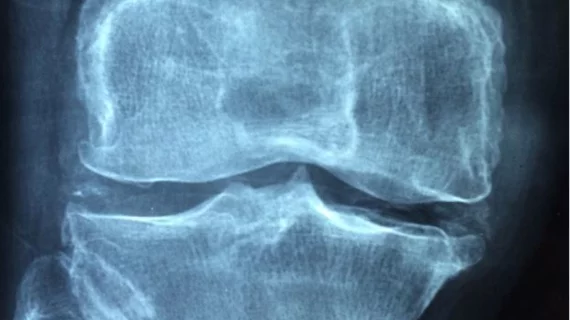AI tool achieves excellent agreement for knee OA severity classification
A commercially available artificial intelligence tool has been externally validated for classifying the severity of knee osteoarthritis on routine radiographs, experts recently shared in the European Journal of Radiology.
More than 300 million people suffer from knee osteoarthritis (OA) worldwide. Depending on the severity of a joint’s degeneration, an individual’s quality of life can be heavily impacted. Classifying OA severity is especially important to those who may benefit from a total knee replacement, such as patients who suffer from end-stage degeneration.
“The diagnosis of knee osteoarthritis is mainly clinical, but weight-bearing radiography of the knee is recommended in clinical guidelines,” corresponding author M.W. Brejneboel, with the department of radiology at Bispebjerg and Frederiksberg Hospital in Copenhagen, Denmark, and co-authors explained. “The radiograph is especially valuable for the evaluation of surgical candidacy.”
Due to the wide availability of routine extremity radiographs and shortages in radiology personnel, many knee X-rays are not interpreted by radiologists, but by referring providers instead. The unfortunate consequence of this is variable inter-rater agreements, which could result in contrasting treatment options for patients.
Many AI tools for decision support have been introduced in recent years, with some geared specifically for OA severity classification, but external validation that ensures these algorithms can operate in a clinical setting has been lacking. To address this, the authors of the study retrospectively analyzed 99 weight-bearing, posterior-anterior knee X-rays from 50 patients to compare the grading performance of a commercially available AI tool (developed by Radiobotics ApS, Copenhagen, Denmark) to two musculoskeletal radiology consultants.
Using real-world clinical images, the AI tool achieved good to excellent agreement with the radiology consultants that was similar to the agreement the consultants had with each other. Between the consultants, intra-rater agreement of .96 and .94 was observed, compared to the AI tool agreement of 1.
In addition to reader agreement, the authors noted several benefits of using AI tools for OA classification severity, including a reduction of reading times and workflow optimization, both of which can result in overhead savings.
“We found that the tool achieved a similar and almost perfect agreement with the musculoskeletal radiology consultant consensus,” the experts reported. “Our findings support the use of the tool for decision-aid in daily clinical knee osteoarthritis reporting.”
The detailed research can be viewed in the European Journal of Radiology.
More on orthopedic imaging:
New guidance for knee cartilage MRI seeks to prevent irreversible osteoarthritis
Multi-slice knee MRI technique saves time without sacrificing quality
Outpatient IR procedure for knee arthritis helps patients who could barely walk
Advanced AI spots urgent hip fractures, with potential for emergency radiology triage

